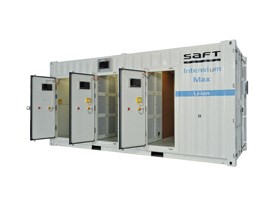FORTUM CORPORATION PRESS RELEASE 22 April 2016
Fortum is launching the Nordic countries’ biggest electricity storage pilot project incorporating Saft’s megawatt-scale Li-ion (lithium-ion) battery energy storage technology. The objective is to research the suitability of batteries used for storing electricity to maintain a power balance in the electricity system. Additionally, the research will explore new opportunities offered by electricity storage and by the flexible intermediate storage of electricity. For the project, Saft’s Li-ion containerised battery system with a nominal output of 2 megawatts (MW) and 1 megawatt hour (MWh) of energy capacity will be installed at Fortum’s Suomenoja power plant in Finland.
“We are also researching the battery’s optimal use together with the production and the demand flexibility-based virtual power plant,” says Tatu Kulla, Head of Operations, Fortum.
The battery project is an extension of Fortum’s pioneering experiment started in March in which a virtual power plant based on demand flexibility is being built together with customers. The capacity of this power plant will be offered to the national grid company Fingrid to maintain a continuous power balance in the electricity system.
The planning of the Suomenoja battery project has been started, and the aim is to start the installation work during September 2016. Test use of the electricity storage is estimated to begin in October. The battery will be supplied by Saft, the world leader in the design and manufacture of advanced technology batteries for industrial applications. The project’s investment cost is about two million euros, for which Fortum will receive a 30 per cent energy investment subsidy from the Ministry of Employment and the Economy.
Suomenoja is an ideal test environment for the pilot because the power plant already has in use an industrial-scale heat pump station, which produces about 300,000 MWh, i.e. as much as 15 per cent of Espoo’s district heat demand. Additionally, one of Finland’s biggest thermal batteries is currently under construction at the plant; it can store about 800 MWh of thermal energy. This is equivalent to the heat consumption of about 13,000 single-family homes per day.
“Increasing the amount of energy produced with solar and wind power will increase the need for regulating power that balances the electricity network and for new storage solutions. When the weather is sunny or windy, there is plenty of energy production, but less demand, so it makes sense to store the electricity. In this project we are also researching new business models that can be developed with electricity storage for electricity companies and customers,” Tatu Kulla says.
"We look forward to working in cooperation with Fortum in this important project to develop future operational and business models for advanced Li-ion energy storage systems in electricity grids", says Glen Bowling, Transportation, Telecom & Grids Senior Vice President Sales at Saft.
Fortum Corporation
Corporate Communications
Further information:
Tomas Qvickström, Head of Business Development, tel. +358 50 453 6298
Tatu Kulla, Head of Operations, tel. +358 400 294 499
Read more about the demand flexibility and its use in maintaining a power balance:
http://www.fortum.com/en/corporation/research-and-development/virtual%20power%20plant/pages/default.aspx
Electricity storage
Electricity storage is a part of the future energy system, the so-called solar economy. With the intermediate storage of electricity, supply and demand can be better balanced, and the storage can also function as an electricity network stabiliser in malfunction situations. Other advantages of electricity storage include its ability to be instantly deployed and its easy adjustability. Moreover, electricity storage reduces the need for fossil fuel-fired peak load plants.
Fortum
Fortum’s vision is to be the forerunner in clean energy. We provide our
customers with electricity, heat and cooling as well as other energy solutions
that improve present and future life. Already 64% of our electricity generation
is CO2 free. Our main markets are the Nordic and the Baltic countries, Russia,
Poland and India. In 2015, we employed some 8,000 energy sector professionals,
and our sales were EUR 3.5 billion. Fortum’s share is listed on Nasdaq
Helsinki. www.fortum.com
Saft
Saft (Euronext: Saft) is a world leading designer and manufacturer of advanced technology batteries for industry. The Group is the world’s leading manufacturer of nickel batteries and primary lithium batteries for the industrial infrastructure and processes, transportation, civil and military electronics’ markets. Saft is the world leader in space and defense batteries with its Li-ion technologies which are also deployed in the energy storage, transportation and telecommunication network markets. More than 4,100 employees in 19 countries, 14 manufacturing sites and an extensive sales network all contribute to accelerating the Group’s growth for the future. Saft batteries. Designed for industry. www.saftbatteries.com
